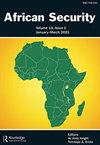Peace-Making, Military Integration, Banditry, and Weaponization of the COVID-19 Pandemic by Extremist Groups
IF 1.3
Q2 POLITICAL SCIENCE
引用次数: 0
Abstract
This issue of African Security covers themes as diverse as peace-making, military integration, banditry, and weaponization of the COVID-19 pandemic by extremist groups. Contexts covered include East, West and Central Africa. The first paper in this issue, “A Faulty Prescription? Critiquing Joint Security Units after Peace Agreements in Sudan, South Sudan, and the Central African Republic,” problematizes the doctrine of military integration and establishment of joint units. Aly Verjee argues, in cases drawn from Sudan, South Sudan and the Central African Republic, that the results produced by these joint units have been largely disappointing because of politics. The second paper in this issue, “Beyond ungoverned spaces”: Connecting the Dots between Relative Deprivation, Banditry, and Violence in Nigeria’, challenges the concept of “ungoverned spaces,” which is fast approaching hegemonic status in analyses of violence in several parts of sub-Saharan Africa. Promise Frank Ejiofor produces a nuanced and textured argument noting that the concept does not put socioeconomic issues into cognizance. Ejiofor emphasizes the salience of material and ethnic grievances of pastoralists in cases of banditry and warns against the utilization of military measures, which may lead to persistence of violence. Olajide O. Akanji’s paper “In Hindsight: The African Union’s Peacemaking Role in Côte d’Ivoire’s Post-Election Crisis (2010–2011),” is the third piece in this issue. Akanji, building on existing literature, argues that the AU’s role was more robust than mere mediation. The paper’s argument is instructive. Akanji argues that the deployment of force by UNOCI/Force Licorne is an AU shortcoming and should not be construed as a failure of enquiry methods and conciliation. Akanji underscores how the international political environment acts as a constraining device on the AU’s capacity. The final article in this issue is titled “The Potential for Violent Extremist Organizations in Africa to take Advantage of the COVID-19 Pandemic Crisis in Ungoverned Spaces: The Cases of al-Shabaab and Boko Haram.” In this piece, Viktor Marsai and István Tarrósy argue that violent extremist organizations have weaponized the COVID-19 pandemic. Drawing on examples from al-Shabaab and Boko Haram, Marsai and Tarrósy demonstrate how states have struggled to provide services during the pandemic while at the same time trying to deal with violent extremist organizations. The paper argues that states have been slower to adapt to the pandemic than violent extremist organizations. Consequently, alAFRICAN SECURITY 2022, VOL. 15, NO. 2, 89–90 https://doi.org/10.1080/19392206.2022.2085427极端主义团体对新冠肺炎疫情的和平制造、军事整合、土匪和武器化
本期《非洲安全》涵盖了各种主题,如缔造和平、军事一体化、盗匪和极端组织将新冠肺炎疫情武器化。所涵盖的背景包括东非、西非和中非。本期的第一篇论文《错误的处方?在苏丹、南苏丹和中非共和国达成和平协议后批评联合安全部队》对军事一体化和建立联合部队的理论提出了质疑。Aly Verjee认为,在来自苏丹、南苏丹和中非共和国的案件中,由于政治原因,这些联合部队的结果在很大程度上令人失望。本期的第二篇论文《超越无政府空间:连接尼日利亚的相对剥夺、土匪和暴力之间的点》挑战了“无政府空间”的概念,在对撒哈拉以南非洲几个地区暴力事件的分析中,“无政府空间”正迅速接近霸权地位。Promise Frank Ejiofor提出了一个细致入微、富有质感的论点,指出这个概念并没有将社会经济问题纳入考虑范围。Ejiofor强调,在土匪案件中,牧民的物质和种族不满情绪十分突出,并警告不要使用可能导致暴力持续存在的军事措施。Olajide O.Akanji的论文《后知后觉:非洲联盟在科特迪瓦选举后危机中的和平作用(2010-2011)》是本期的第三篇。阿坎吉在现有文献的基础上认为,非盟的作用比单纯的调解更为有力。这篇论文的论点很有启发性。阿坎吉认为,联科行动/独角兽部队部署部队是非盟的一个缺点,不应被解释为调查方法和调解的失败。阿坎吉强调,国际政治环境是如何制约非盟能力的。本期的最后一篇文章题为《非洲暴力极端主义组织在无人管理的空间利用新冠肺炎大流行危机的潜力:青年党和博科圣地的案例》。在这篇文章中,Viktor Marsai和István Tarrósy认为,暴力极端主义组织已将新冠肺炎大流行武器化。Marsai和Tarrósy以青年党和博科圣地为例,展示了各州在疫情期间如何努力提供服务,同时努力应对暴力极端组织。该论文认为,与暴力极端主义组织相比,各州适应疫情的速度较慢。因此,《2022年非洲安全》,第15卷,第2期,89–90https://doi.org/10.1080/19392206.2022.2085427
本文章由计算机程序翻译,如有差异,请以英文原文为准。
求助全文
约1分钟内获得全文
求助全文

 求助内容:
求助内容: 应助结果提醒方式:
应助结果提醒方式:


